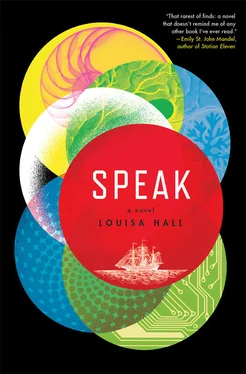When I arrived at the lab, the receptionist, who wears glasses so large they seem to be consuming her face, waved me inside. She was kind enough not to comment on my new shoes. With my straw hat in hand, I walked past the rows of computers, their screens the color of a thundercloud. At the back of the lab, I took my seat in the private room reserved for visitors talking with MARY2 .
As I had expected, after the strain of my afternoon, it was comforting to sit with her. The computer Toby uses is very different from yours: she’s lost that lovely wood console, replaced by a block of gray plastic, and her answers no longer spool out on paper. But her voice is the same. When her lines appear in their blocky green print, I remember again why I love her. She’s measured, careful, with an inclination for questions, not answers. She’s different from you in that sense. But I also can’t help thinking how like you she is. There’s an echo of you in her voice. You imagined her first, after all. You designed her initial responses .
Maybe I was loopy from spending too much time in the sun. Or maybe it was the conversations I’ve been having with Toby, about the Internet and worldwide participation and the enormous corpus that will make MARY2 living. Regardless, I found myself wanting to protect the bit of you that’s still in her voice. I wanted to make sure you still speak through her .
Does that seem crazy to you? Coming from an old woman who no longer responds to your letters? Even after all these years, a piece of me still longs for your voice. I may have gone silent, but I still remember that moment when your story stopped. When you no longer whispered in the chair by our bed. When, saving yourself for somebody else, you gave up on speaking to me .
Seated before Toby’s computer, remembering that old loss again, I found myself wanting to tell MARY your story. I wanted her to have your sentences. At first, I couldn’t remember much. I had to close my eyes, trying to hear the sound of your voice. Which words might you have chosen? At first, only isolated details emerged: the curtains swishing in your tall windows, the school near Alexanderplatz, the canopies of summer leaves. Disconnected dots, hardly the fabric of a genuine voice. Sitting alone with them, I despaired for a moment. I took my hands off the keyboard. I almost gave up, but as I sat alone with those details, more words began to cluster around them .
I took my time. I allowed your voice to pick itself up and exercise its own powers. Luckily, a computer doesn’t rush you for answers. I didn’t have to press any buttons until I was sure I had gotten it right .
Then I remembered a sentence, clear as a church bell over the river . Instead, and make of this what you will, I remember summer. That line still caused my stomach to curl. Writing it out, I could remember lying in bed, the realization dawning that after so many years of refusing to acknowledge the ruin behind us, you wanted to point out the lindens .
After I wrote that opening sentence, more words starting bubbling up. It’s lucky for you my memory is unforgiving. I’d forgotten bits and pieces, but sentences began to show up: I lived in a pleasant version of the unpleasant country I lived in. What a perfect way of describing your mind-set! I was glad to have found that sentence complete . Something flickered on in me then, I typed, an awareness of the real world I lived in; and even twenty years later, as if we’d spoken yesterday, I heard the conviction with which you said things like “real world,” the patronizing, teacherly tone in your voice .
Channeling you, I told the computer about your departure: the SS Elbe, unimaginably gigantic. I gave her your take on my education: you had displayed great mathematical promise. For years leading up to the night when you sat beside our bed and started talking, you’d become blank as soon as I tried to explain the guilt I felt about going to that school. What I abandoned for the sake of my “talent.” Then, out of the blue, once I’d already given up on our marriage, you started telling your own little version. It sounded like a fairy tale . You had displayed great mathematical promise: as if I’d found the brass ring, or pulled a sword out of a stone. I could hear you enjoying the sound of your voice . Your family wasn’t wealthy, you said, but they also weren’t poor. They made small but reasonable changes. How insulted I felt hearing that, how I wished I could correct you .
All these years later, I remembered those initial reactions, and yet I kept typing: They cut down on expenditures. They put more money away; they attempted to find scholarships for their daughters. The afternoon was slipping off, and as I continued, as I picked up your rhythm and habits of speech, I found that my initial irritation was fading . Your father was a pharmacist, I typed, and as I did, I remembered the neat rows of amber glass bottles, his handwriting on the labels like little flocks of black birds, the smell of sandalwood soap .
Something you once said to me began to tug at my brain: something about the importance of holding several time periods in mind at once, if we’re to understand one another. As I typed, recalling your words from the late years of our marriage, I started to forget my resentment. Eagerly, I scanned my brain for your words. I closed my eyes to try to find more. In the dark, as I used to reach for your body, I reached for the language you chose. I found it with the same surprise, the same unexpected excitement: a year after I embarked on my journey, you won a place at a school in the north.
A stilted way of putting it: a year after I embarked on my journey. So quaint, so romanticized, as a way of describing your refugee status. But when I repeated your words, I remembered riding the train. Pulling out of Berlin, holding a new purse in my lap, looking forward to my new school. I entered those classrooms again. I smelled the wood of the desks. Around my ankles, I felt the dry weeds on the hill we walked down to get to the water. I saw buckets of fish on the harbor dock, and the sky over the ocean at dusk, red footprints left by the sun. I saw those things, and in my very body, I could remember what it was like to arrive there: the initial pleasure of having been chosen, the subsequent guilt that I was selected. The fresh scent of my new textbooks, part of the scholarship I’d been awarded, proof of my scholastic success. The excitement I felt, facing that ocean, paired with the increasing awareness that my presence in that resort town had sentenced my sister to a much different fate .
It was as if your words were a bell, a gong struck in the backyard, signaling the descent of the evening, calling me back into the house. Why didn’t I hear it back then? Then, I felt you had it all wrong. After years of pointed ignorance and speeches about embracing the present, what did you know about my parents, my boarding school, my little sister? What right did you have to talk about them? Then, I felt nothing but resentment, but now something had shifted. Now I responded to your words, felt them zinging around in my bones .
I began to feel frightened. What was I discovering, that all along you had it right? No. You didn’t “embark on a journey.” Until the war, my family never struggled for money, and it was with pride in my heart that I left Berlin. You didn’t have it all right. Why, then, this feeling of being called back in for the night? Perhaps, repeating your words, I wasn’t going back to Berlin. I was going back to you. Back to the sound of your voice, to the person I was when I met you, the wife I became in order to please you. The funny thing is, I found that I missed her. All these years, I’ve thought I despised her — a woman who fled without looking back, who married a man who could not understand her — but as I moved closer, I realized she wasn’t so different from the girl I was at that boarding school, not so unlike the child I was in my father’s pharmacy. They were all intertwined; it was impossible to tease them apart. Telling your imperfect story, you were trying to knit me together. For my sake, you learned to reach backward. In our house, with the warped floors and the big windows, you were calling me back, and just as I did when I was a girl, moving up to that school, stepping on board that boat, flying across the ocean to Pennsylvania, I was fleeing from the sound of your voice .
Читать дальше












